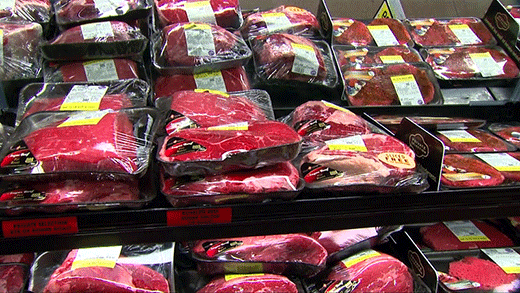
K-State researchers are reporting that beef is consumed three times more often than plant-based proteins in the U.S.
Study: Consumers still favor beef as protein source
Researchers compare consumption of beef to plant-based protein alternatives
Feb. 22, 2021
MANHATTAN, Kan. – Consumers who prefer beef over plant-based protein alternatives said they are willing to pay nearly two dollars more per meal for a burger when dining at a restaurant, according to a study from Kansas State University.
But, the same study notes, those who have turned to plant-based protein alternatives are equally passionate about their choice, saying they would be willing to pay $1.48 more per meal.
Those are among the key findings released by K-State agricultural economists Glynn Tonsor and Ted Schroeder in the study, Impact of New Plant-Based Protein Alternatives on U.S. Beef Demand. The study was co-authored by Jayson Lusk, a Distinguished Professor of agricultural economics at Purdue University.
“Beef has what we call a good image and we document it as a good image throughout the report,” Tonsor said. “We’ve looked at a litany of questions, such as how does beef compare to plant-based proteins on a lot of dimensions, such as taste, safety, price, nutritional content, protein, iron and even on whether it’s good for farmers, the planet and consumers.”
Listen to an interview by Eric Atkinson with Glynn Tonsor on the weekday radio program, Agriculture Today
The nationwide study involved more than 3,000 consumers that represented the population of the country. Nearly 70 percent of respondents identified themselves as regular meat consumers (those who regularly consumer meat or food from animals), while the remainder identified with such alternative diets as vegan, vegetarian, flexitarian or other.
Tonsor said regular meat consumers reported being willing to pay $1.87 more per meal for a beef burger in a restaurant. They also would pay up to .29 more per pound for store-brand, 80% lean ground beef at the grocery store.
Those who prefer alternative diets would pay $1.48 more per meal in a restaurant, and up to $2.32 per pound more in the grocery store.
“There’s a big preference among regular meat consumers today for the beef burger, and there’s a strong preference among the alternative diet folks for those newly offered items,” Tonsor said.
But the number of consumers choosing beef over plant-based alternatives is clearly in favor of the beef industry. The report notes that beef is consumed three times more often than plant-based proteins in the U.S.
Among the factors influencing consumer’s choices are they consider the taste, safety and price of beef to be more appealing. “Those are key differentiation points we see in this study and have seen in several studies,” Tonsor said. “Taste and safety, in particular, are key drivers of U.S. beef demand.”
“The protein market is immensely competitive, both from existing and new products being introduced,” he added. “At the same time, global protein demand is strong and growing. The U.S. beef industry produces a high quality, tasty, safe, nutritious, healthy, and affordable product in an increasingly sustainable way. Capitalizing on what the industry does well while continuously striving to do it better is the best advice we can provide to compete in the evolving global protein market.”
The full report, as well as an executive summary, is available online from the K-State Department of Agricultural Economics’ website, agmanager.info.

